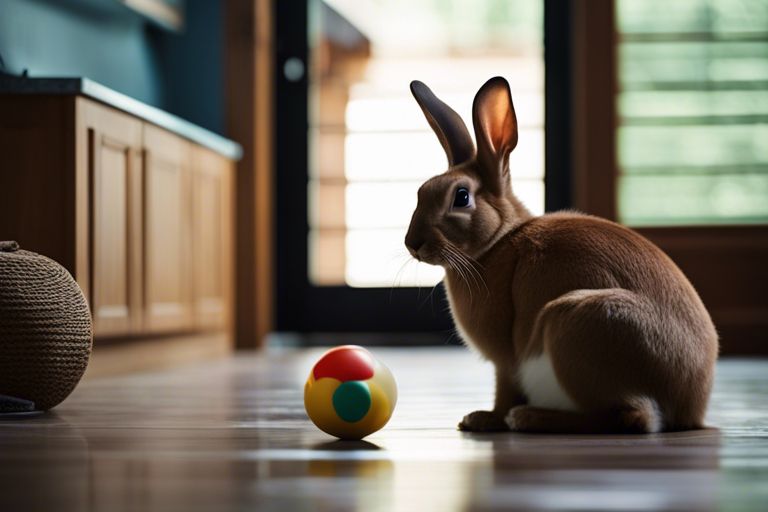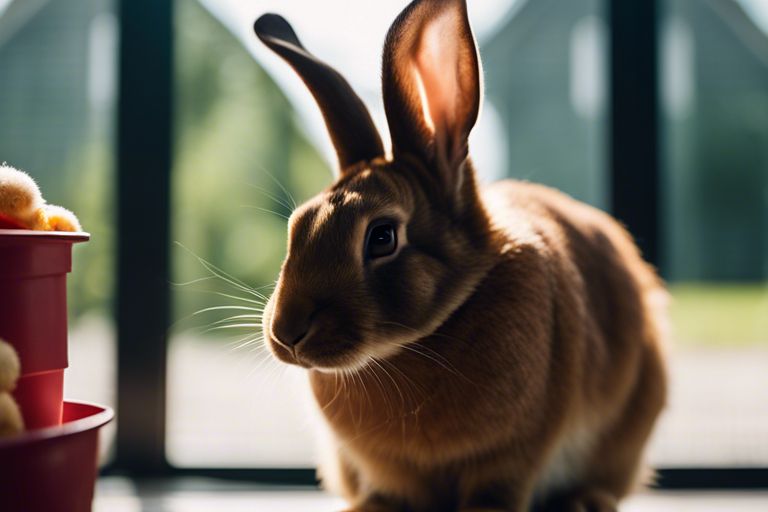Experiencing separation anxiety in your beloved Flemish Giant rabbit can be a worrying and distressing experience for both you and your pet. While it is generally uncommon for rabbits to develop this condition, it is not impossible, especially in the case of Flemish Giants. This blog post aims to provide you with a comprehensive understanding of the signs, causes, and potential risks of separation anxiety in Flemish Giants, as well as effective strategies to prevent and manage this issue.
Key Takeaways:
- Flemish Giants can develop separation anxiety: Despite their size and independence, Flemish Giants are social animals and can become distressed when left alone for long periods.
- Symptoms may include destructive behavior: When suffering from separation anxiety, Flemish Giants may exhibit destructive behaviors such as chewing on furniture or digging at carpeting.
- Proper socialization can help prevent separation anxiety: Introducing Flemish Giants to various people, animals, and environments from a young age can help reduce the likelihood of separation anxiety developing.
- Training and mental stimulation are important: Providing training and mental stimulation can help alleviate feelings of anxiety and boredom in Flemish Giants, reducing the risk of separation anxiety.
- Consult a veterinarian or animal behaviorist if necessary: If a Flemish Giant displays severe or persistent symptoms of separation anxiety, it is important to seek professional help from a veterinarian or animal behaviorist for appropriate guidance and support.
Flemish Giant Rabbit Overview
Obviously, if you are interested in owning a Flemish Giant rabbit, you need to know more about them. Flemish Giants are the largest domesticated rabbit breed, known for their docile nature and playful personalities. They can make wonderful pets for the right owner, but it’s important to understand their unique traits and needs before bringing one home.
Size and Strength Considerations
When it comes to Flemish Giants, their size is one of the first things that you notice. These rabbits can grow to be over 20 pounds, making them much larger and stronger than other breeds. This means that they require a sturdy enclosure and plenty of space to move around. Additionally, their large size also means that they need a diet rich in hay and fresh vegetables to support their growth and overall health.
Temperament and Socialization
One of the most notable characteristics of Flemish Giants is their gentle and friendly nature. They are known to be great with children and other pets, making them a good choice for families. However, it’s important to remember that they are prey animals, and may be easily startled, so providing them with a calm and predictable environment is key to keeping them happy and content.
Child-Friendly and Pet-Friendly Aspects
Flemish Giants can make fantastic pets for families, as their docile nature and gentle temperament make them well-suited for interaction with children. They are also known to get along well with other pets when properly introduced. However, their large size means that they should be handled with care, especially by younger children, to prevent accidental injuries.
Throughout the article, we will look at the various aspects of Flemish Giant rabbits, from their size and strength considerations to their temperament and socialization, and the pet-friendly aspects that make them a great addition to any household. By the end, you will have a comprehensive understanding of what it takes to care for and live harmoniously with a Flemish Giant rabbit.

Factors Influencing Flemish Giant Behavior
Lastly, it’s important to consider the various factors that can influence the behavior of Flemish Giants, including their genetic predisposition, early socialization, and their environment. Here are some key factors to consider:
- Genetic Predisposition: Flemish Giants, like all rabbit breeds, may have a genetic predisposition to anxiety and stress.
- Early Socialization: How well-socialized a Flemish Giant is as a young rabbit can have a big impact on their behavior as adults.
- Environment: The environment in which a Flemish Giant lives, including the presence of other pets, noise levels, and amount of human interaction, can greatly influence their behavior.
Perceiving signs of separation anxiety in your Flemish Giant can be concerning, but understanding the factors that influence their behavior can help you address these issues effectively.
Rabbit Separation Anxiety – Animal Behavior Network
Importance of Obedience Training and Positive Reinforcement
Obedience training and positive reinforcement play a crucial role in shaping the behavior of Flemish Giants. By establishing boundaries and teaching them commands, you can help them feel more secure and reduce the likelihood of anxiety issues. Using positive reinforcement, such as treats and praise, can also help reinforce good behavior and build a stronger bond between you and your Flemish Giant.
Energy Levels, Exercise Requirements, and Environmental Enrichment
Understanding the energy levels and exercise requirements of Flemish Giants is essential for their overall well-being. Providing them with enough mental and physical stimulation through environmental enrichment, such as toys and playtime, can help prevent anxiety and stress by keeping them mentally and physically engaged.
Health and Care for Flemish Giants
To ensure the well-being of your Flemish Giant, it is important to be aware of their specific health and care needs. This breed requires special attention to their nutrition, grooming, and overall healthcare to ensure a long and healthy life.
Nutritional Needs and Diet Recommendations
When it comes to feeding your Flemish Giant, it’s crucial to provide a balanced diet that meets their unique nutritional needs. Hay should make up the majority of their diet, supplemented with leafy greens, vegetables, and a limited amount of pellets. It’s important to monitor their weight and adjust their diet as needed to maintain a healthy size. Including hay in your Flemish Giant’s diet helps to promote proper digestive health and prevent obesity.
Grooming, Shedding, and General Healthcare
Regular grooming is essential for the overall health and well-being of your Flemish Giant. Their thick fur requires frequent brushing to prevent matting and reduce shedding. Additionally, regular nail trims and dental care are important aspects of their general healthcare. Keeping an eye out for any signs of illness or discomfort is crucial, and a regular check-up with a veterinarian is recommended to address any potential health issues.
With proper care and attention to their specific needs, you can ensure that your Flemish Giant remains healthy and happy. By understanding the nutritional requirements and implementing a grooming routine, you can play a vital role in your pet’s overall well-being. Taking the time to address these important aspects of care will help ensure a long and fulfilling life for your beloved Flemish Giant.
Managing Separation Anxiety in Flemish Giants
After recognizing the signs of separation anxiety in your Flemish Giant, it’s important to take steps to manage and alleviate their distress. These gentle giants can become incredibly bonded to their owners, and it’s crucial to address any anxiety that may arise when they are left alone.
Recognizing the Signs and Remedies
If you notice your Flemish Giant displaying destructive behavior, excessive vocalization, or distress when you leave, it could be a sign of separation anxiety. To remedy this, consider desensitizing your bunny to your departure by gradually increasing the time you spend away from them. Providing them with engaging toys and activities while you’re gone can also help distract and comfort them.
Strategies for Prevention and Intervention
Prevention of separation anxiety in Flemish Giants can involve establishing a predictable routine, creating a safe and comfortable environment for your bunny, and gradually introducing them to being alone. If your bunny is already experiencing separation anxiety, seeking professional help from a veterinarian or an animal behaviorist can provide valuable insight and strategies for intervention.
By addressing the signs and remedies of separation anxiety in your Flemish Giant, you can provide them with the support and care they need to thrive. It’s essential to be patient, consistent, and understanding as you work through this process. And remember, your bond with your bunny is a powerful source of comfort and reassurance for them.
Can Flemish Giants Develop Separation Anxiety?
Taking this into account, it is important to recognize that Flemish Giants, like any other pet, can develop separation anxiety. This can manifest in various ways such as destructive behavior, excessive vocalization, and even physical symptoms like loss of appetite. It is important to address these issues early on by providing your Flemish Giant with plenty of mental and physical stimulation, and gradually acclimating them to being alone for short periods of time. Additionally, seeking the help of a professional trainer or veterinarian can also be crucial in managing and preventing separation anxiety in your Flemish Giant.
FAQ
Q: Can Flemish Giants develop separation anxiety?
A: Yes, Flemish Giants are known to be prone to developing separation anxiety. They are social animals and bond closely with their owners, so being left alone for long periods of time can lead to stress and anxiety.
Q: How can I prevent separation anxiety in my Flemish Giant?
A: To prevent separation anxiety in your Flemish Giant, it is important to gradually acclimate them to alone time. Start by leaving them alone for short periods and gradually increase the time. Providing enrichment such as toys, treats, and a comfortable environment can also help alleviate anxiety when you are not present.
Q: What are the signs of separation anxiety in Flemish Giants?
A: Signs of separation anxiety in Flemish Giants can include excessive barking, destructive behavior, pacing, panting, or attempting to escape. Additionally, they may show signs of distress when you are preparing to leave, such as following you around or becoming agitated.
